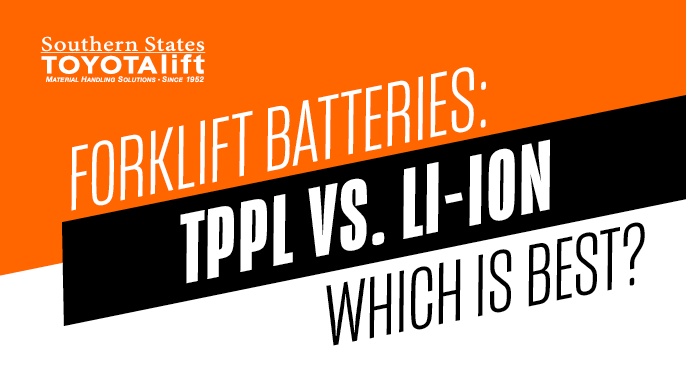Thin Plate Pure Lead (TPPL) Batteries vs. Lithium Ion (Li-ion) Batteries: Which is Best?
by Theodore Taylor, on Mar 12, 2024 2:24:37 PM
 At one point, warehouse managers had to choose between a horsecart and an automobile. Technology has come a long way since then. Still, whenever new options arrive, the question remains: which is best for your operation?
At one point, warehouse managers had to choose between a horsecart and an automobile. Technology has come a long way since then. Still, whenever new options arrive, the question remains: which is best for your operation?
Forklift batteries are no different, and you may have heard about the latest option, thin plate pure lead. In this article, we’ll explain TPPL battery technology and discuss how it stacks up against lithium-ion. Read on to find out which battery is best for your facility.
Thin Plate Pure Lead Batteries
Thin plate pure lead (TPPL) batteries hit the market about 50 years ago in other sectors. However, they are a relatively new option in material handling. These batteries are technically lead acid but represent a huge step forward from the standard flooded lead acid batteries. Like standard batteries, TPPLs use lead plates for their electrodes and generate power by electrolytes flowing from the positive plate to the negative.
However, that's where the similarity ends. Each TPPL battery uses ultra-thin plates of 99% pure lead. Thin plates mean more electrodes per battery and better efficiency. This electrode density translates to more power. Additionally, there is no water inside TPPL batteries. Instead, an electrolyte absorbent glass mat (AGM) rests between the positive and negative electrodes. This allows electrolytes in the form of oxygen to pass between the electrodes, generating power more efficiently.
TPPL Battery Advantages
- Exceptional performance. The greater number of plates increases the energy the battery generates and allows it to run longer with little to no drop in voltage.
- Shock and vibration resistant. These batteries are highly resistant to shock and vibration, which makes them excellent for rugged applications.
- Opportunity charging. The purity of the lead dramatically reduces the battery’s internal resistance. Lower resistance means the battery charges faster. In fact, TPPLs can charge to 70% capacity in about an hour, allowing your operation to utilize opportunity charging.
- Maintenance free. These batteries do not require watering or lengthy equalizations. Likewise, they do not corrode like traditional lead acid batteries. Just charge them to 100% capacity once weekly, and you are good to go.
- No infrastructure changes. TPPL batteries do not need current limiters, eliminating the need for many infrastructure changes associated with other battery types.
- Cost-effective. These batteries are very inexpensive. Typically, one TPPL battery is about half the price of a comparable Li-ion battery.
TPPL Battery Disadvantage
- Shorter lifespan. These batteries have a shorter useful life than Li-ion. While they are less expensive, they require replacement more often.
Who Needs a Thin Plate Pure Lead Battery?
With their high-power output and opportunity charging capabilities, TPPL batteries are ideal for multi-shift operations. Your operators can charge the battery while on their breaks, and it will deliver consistent power all day long. Additionally, their low cost and reduced infrastructural requirements make these batteries an excellent choice for facilities on a budget. They provide terrific flexibility for a fraction of the cost. Finally, their shock and vibration resistance makes them perfect for forklifts in hard-hitting industries.
Lithium Ion Batteries
Lithium-ion (Li-ion) batteries are also an emerging technology in forklift power. Though used in other industries for decades, recent improvements in their composition have made them increasingly popular in material handling. These are a whole different configuration than lead acid batteries, both standard and TPPL.
In a Li-ion battery, the battery’s anode stores lithium ions. When the battery discharges, those ions move from the anode to the cathode on the other side of the battery. In doing so, they cross a separator that allows the ions through but not electrons. This causes released electrons to flow from the anode to the cathode by passing through the powered equipment.
Li-ion Battery Advantages
- No voltage drop. One of the significant benefits of Li-ion power is that there is no voltage, ensuring your forklift will not stall, slow, or stop unexpectedly, even under heavy use.
- Rapid recharge. These batteries charge even more quickly than a thin plate pure lead battery. They can often reach 100% charge in under an hour.
- Maintenance free. These batteries do not require watering or equalization at all. Similarly, they do not corrode. Also, they can be fully discharged with no damage to the battery.
- Longer shelf life. Due to their extremely power-stable nature, Li-ion batteries do not self-discharge. Charged batteries may sit in storage for long periods unused without any loss of power or damage to the battery.
- Longer product life. TPPLs have an expected lifespan of three years. However, Li-ion will last for five or more.
Li-ion Battery Disadvantages
- Cost. Li-ion batteries are more expensive than a thin plate pure lead battery.
- Reduced impact resistance. These batteries are less shock and vibration-resistant than TPPLs.
- Infrastructure modifications. Li-ion batteries typically require infrastructure changes to accommodate their charging stations.
Who Needs a Lithium Ion Battery?
Consistent voltage, full discharge capability, and rapid charging make Li-ion batteries an excellent choice for high-throughput facilities. These batteries excel at consistent, around-the-clock use. Additionally, their extended lifespan means they need replacing less often than other battery types. Li-Ion is an excellent choice for operations willing to make a larger upfront investment to reap the rewards of longevity later.
The Right Battery for Your Facility
As forklift battery technology continues to improve, options for powering your electric forklift fleet will increase. All these options can make selecting the best battery type for your facility challenging. That's where we can help. Our Energy Solutions Team can provide a free power study of your facility. This evaluation uses hard data to pair your process with the power solution best suited to your needs. To learn more or to schedule your free power study, contact us online or visit one of our locations throughout Georgia and Florida.
Florida
Jacksonville
Lakeland
Ocala
Orlando
Tampa
Winter Haven
Georgia
Albany
Macon
Columbus
Valdosta
Further Reading
Are Lithium-Ion Forklift Batteries Right For Your Business?
Forklift Battery Charging Methods: What’s Best for Productivity
3 Common Misconceptions About Electric Forklifts









